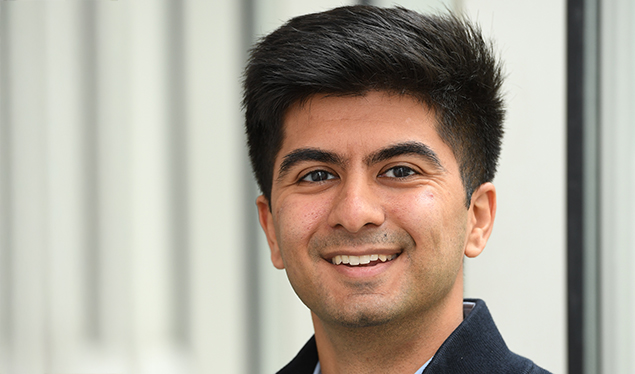
Nikhil Sadaranganey (2L) brings a wealth of leadership and policy experience to Seton Hall Law, from serving as Rutgers Student Body President to working on Capitol Hill and at Proskauer Rose. This summer, he interned at Lowenstein Sandler, sharpening his litigation skills and continuing to blend advocacy with law.

What inspired you to pursue a career in law, and how did your time at Rutgers shape that decision?
I was always interested in law and politics as a high school student, competing in activities like Model United Nations and the We the People constitutional law competition. At Rutgers, writing a thesis in the Gardner program, taking an undergraduate constitutional law class, and interning with the Rutgers Office of Federal Relations showed me that a career in law would be the perfect intersection of my interests and skills.
How has your role as a 1L Senator helped you connect with and advocate for your peers at Seton Hall Law?
Serving as a 1L Senator put me in direct contact with my fellow students, as I was the first point of contact when they had questions or feedback for the SBA. I also connected with classmates at the section social I hosted early in the semester. In terms of advocacy, vice-chairing the SBA Academics and Curriculum Committee allowed me to help propose a change to the pass-fail policy, which was a direct response to student feedback.
You worked as a paralegal at Proskauer Rose before law school—what lessons from that experience have been most valuable during your legal studies?
The biggest takeaway from my time as a paralegal was observing how hardworking and diligent the practicing attorneys were. The level of detail and focus they put into their work inspired me to bring that same commitment to my readings and outlines when I began law school.
What has been the most rewarding or eye-opening part of your internship with Lowenstein Sandler so far?
The most rewarding part of my internship at Lowenstein Sandler was working directly with partners on my summer projects. Receiving feedback from attorneys with decades of experience helped me elevate my writing and research skills.
As former Student Body President at Rutgers, you managed a million-dollar budget and represented over 35,000 students—how has that leadership experience influenced your approach to law and advocacy?
Representing so many students taught me that the best leaders listen first. If you are not a good listener, you cannot fully understand what your constituents or clients need, and that means you won’t be an effective advocate. I strive to ensure I truly hear what people are asking of me before suggesting ideas or moving forward on a project.
Your internships have spanned Capitol Hill, higher education policy, and legal practice. How do these different experiences complement each other?
On Capitol Hill, I learned how responsive staffers must be, since we received new information constantly. As an education policy advocate, I saw how much preparation went into a single advocacy meeting. As a paralegal, I had to be meticulous in preparing attorneys’ materials. Being responsive, prepared, and diligent all complement one another and have been invaluable in law school.
From lobbying in D.C. to drafting congressional communications, what’s a moment you’re especially proud of from your pre-law school career?
As a paralegal, I was specifically requested by a partner to manage the logistics for an arbitration hearing. The hearing went smoothly, and it was the first project I completed without supervision from a senior paralegal. Successfully carrying that responsibility was definitely a point of pride.
What skills or habits have helped you successfully balance academics, professional opportunities, and personal interests like baseball, philosophy, and weightlifting?
I live by my Google Calendar. Writing down all my obligations and knowing exactly where I need to be at any given time has helped me stay on track with both my professional and personal commitments.
How do your interests in philosophy and self-development influence the way you approach challenges in law school?
My approach to academic challenges is influenced by Stoicism, which emphasizes focusing on what you can control rather than what you cannot. During hectic times last year, I leaned on what I could control: taking care of my health, preparing for class, and making time for myself.
Looking ahead, what type of legal work excites you the most, and why?
I am most excited to do litigation work because it offers a forum to exercise skills like public speaking and crafting arguments, which are the aspects of legal practice I enjoy most.